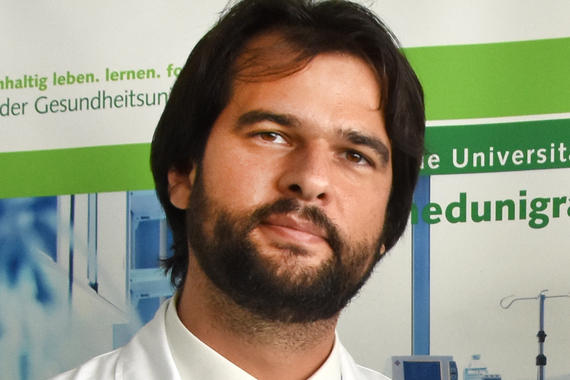-
The University
- Welcome
- Who we are
- Media & PR
- Studying
-
Research
- Profile
- Infrastructure
- Cooperations
- Services
-
Career
- Med Uni Graz as an Employer
- Educational Opportunities
- Work Environment
- Job openings
-
Diagnostics
- Patients
- Referring physicians
-
Health Topics
- Health Infrastructure
Research team Martin Stradner
Autoimmune rheumatic diseases are painful and disabling conditions that can be life threatening. Most of these diseases are driven by a dysfunctional immune system attacking tissue of the own body. Primary Sjögren's disease (pSD) is a systemic autoimmune disease often misdiagnosed or overlooked leading to a significant delay of diagnosis. Therefore, most of the current knowledge on the pathophysiology of pSD is derived from patients with long-standing disease. Patient symptoms, immune phenotype and tissue inflammation at the onset of pSD are unknown and biomarkers for early diagnosis have not been evaluated so far.
Contact

Our goal
The goal of our research is to understand the mechanisms leading to dysfunction of the immune system and rheumatic disease. Therefore, we investigate cohorts at risk for rheumatic disease and animal models to gain insight into the early stages of immune dysfunction. We believe identifying these mechanisms will help to diagnose and ultimately cure rheumatic diseases.
Our projects
Pre-Sjögren Disease Targeted Immunology Evaluation
The overarching goal of the project is to discern whether identified immune system changes are root causes of pSD or mere consequences of persistent inflammation. Structured as a longitudinal cohort study, the project identifies individuals at risk for pSD (pre-Sjogren patients) and follows their progression until the development of pSD or other systemic autoimmune diseases. Instead of relying on data from long-term patients with established immune system dysregulation, this research ventures into uncharted territory, studying changes in individuals as they develop the autoimmune disease. The methodology blends clinical research with cutting-edge laboratory techniques to validate and comprehend the findings. Employing advanced tools like single-cell RNA sequencing, the study conducts in-depth profiling of the involved immune cells.
The Association of Immune Aging and PI3K Signaling in Common Variable Immunodeficiency
Premature ageing of immune cells, also known as immunosenescence, is a commonly observed phenomenon in various conditions like chronic infections, autoimmune diseases and immunodeficiency disorders, like Common variable immunodeficiency (CVID). The underlying mechanisms that lead to this phenomenon are multifaceted and might be overlapping to various degrees in these entities. However, there are diseases that have a well-defined underlying mechanism for this phenomenon, like Activated phosphoinositide 3 kinase (PI3K) -delta syndrome (APDS). In APDS, mutations in the PI3K cause an overactivation of the downstream signaling pathway and consequently lead to premature ageing of immune cells. However, if immunosenescence in patients with autoimmunity is linked to altered PI3K signaling is unclear.
Here, we will investigate whether immunosenescent phenotypes are associated with altered PI3K signaling, regardless of the disease entity. Despite multifaceted underlying mechanisms of immune ageing, there might be an overarching functional alteration that could serve as a therapeutic target.



